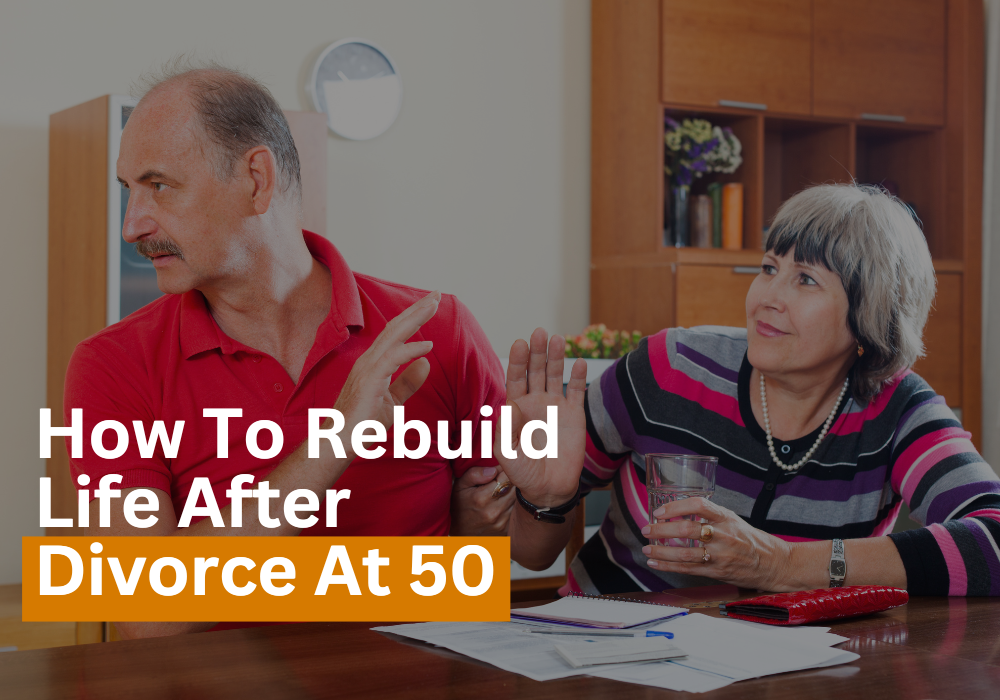Contents
- 1 Rebuilding yourself after divorce – 7 Tips
- 2 Moving on after divorce as a man – 2 Tips Men Must Know.
- 2.1 Step 1: Start working on You.
- 2.1.1 Step 2: Don’t Try To Get Her Back, Get You Back
- 2.1.1.1 a. Walk five miles a day
- 2.1.1.2 b. Walk Out Three to four Times Per week
- 2.1.1.3 c. eliminate sugar, minimize carbs, & Increase protein
- 2.1.1.4 d. Get eight hours of sleep daily
- 2.1.1.5 e. Drink more water than you already do
- 2.1.1.6 f. Eliminate TV watching
- 2.1.1.7 g. Talk to God while you walk
- 2.1.1.8 h. Confide only in a male friend or brother
- 2.1.1.9 i. Let Her Go
- 2.1.1 Step 2: Don’t Try To Get Her Back, Get You Back
- 2.1 Step 1: Start working on You.
- 3 Stay Updated
So finally it happened… You are now officially back to being single. At this point, it does not matter whose fault it was that the divorce happened, you may soon start experiencing all of the challenges that divorced couples go through such as feeling guilty that you divorced, blaming yourself for not being a bit more patient, thinking if there was still something else you could have done personally to save your relationship, maybe you will start thinking about how to cope without your former partner, the sweet moments you spent together, you could even start thinking about the financial implication of staying alone, and several other things you may have going on in your head right now.
These challenges even get compounded because you are not sure you are ready for a second or third relationship (depending on how many divorces you have had). This thought is valid because, in a recent Forbes research on divorce, it was discovered that those who wed multiple times face a far higher rate of divorce. It is so bad that about 67% of second marriages end, and approximately 73% of third marriages are dissolved.
The reason most second marriages end as the first is that past guilts and hurts have never been wiped off, which is why I strongly advise that instead of rushing into another relationship, you should focus more on rebuilding yourself after divorce so that should you consider giving marriage another chance, you will be more prepared.
In this blog content, I will outline 7 tips for rebuilding yourself after divorce. These tips are born out of the personal experiences and stories of two divorcee friends who were able to successfully rebuild themselves after their first and supposedly sweet marriages ended.
Read Also:
How To Rebuild Life After Divorce At 50
Rebuilding yourself after divorce – 7 Tips
Tip 1. Be patient with yourself

From my personal experience interacting with divorcees, I know so often they don’t want to feel the way they have felt. Sometimes they just want to move on and never even feel the sadness that comes with divorce.
But it is hard. It is hard to stay calm and never get upset, it is hard to just forget the past and let it go. It is hard to see your children in the custody of someone else and you don’t have the right to go grab them at all costs. It is also hard to spend some holidays alone whereas you have always spent it together with your family. It is equally hard to wake up in the morning and realise you are all by yourself… no one around you.
These experiences according to my divorcee friends were the worst nightmare of their lives.
Trust me on this one, anyone who has gone through a divorce knows it is not so easy to just allow yourself to be a human being in a short period.
There are going to be days when you are drained emotionally. There are going to be days when you are exhausted. There are going to be days you’re sick of crying and even angry, you will need to learn to channel all of that emotion healthily.
Well, involving in some physical activities like going to the gym, and getting involved in some little sporting activities can also help.
Tip 2: Start Working On Yourself.

Look at all areas of your life and see what areas you need to work on first. I don’t care if you’re going through a divorce and i don’t care if you’re happy in your life. If you look at kind of the circle of life right, think about all these categories within your life, social life, romance, friendships, family, work, money, and health.
You know all of these different aspects of your life and no matter what you’re going through, there’s always going to be areas of your life that you’re working on or you need to work on.
You know some years money’s great and other years maybe money isn’t that great, you know one year, your love life is through the roof but your social life with girlfriends needs some work. so look at all areas of your life and where you want to work on first and understand that rebuilding and getting yourself this way needs work.
Tip 3: Discover where you are & where you want to be
You should start telling yourself the truth about where you currently are. Picture also in your mind where you want to be and at what time you want to get there. I have had lady friends who all their lives depended on their husbands for literally everything. While they work part-time just so they can look after the family, their husbands work full-time and make most of the money for the house.
When they finally divorce, they are left with little or nothing to survive on. So if this is true with you, you must begin to draw that mental picture of how you want to get out of that mess.
Here are areas I advise you to consider as you draw that mental map:
a. Your Family
What is the current state of your family… I mean do you currently have children staying with you? What provision do you currently have for them?… What sort of life do you want for them and how do you plan to get them that life?
b. Finance
Ask questions like: Where am I right now financially and how can I improve on this? You may be experiencing your worst financial nightmares right now after divorce, but trust me, this is not your last story… You can become so financially independent if you clearly define where you want to be and start taking the right steps.
Here are some good examples of things you can do to move from where you are to where you wanna be financially:
- If you must learn a new skill, better finalize it and start immediately.
- Maybe you need to get a new job or probably add a new one
- You can also start a new business, but it is always advisable to start a business on things you are passionate about. Ensure you ask the right questions and from the right people before you invest in starting a new business.
c. Faith
Whatever your religion is, you must ascertain what your level of commitment is right now. If you are a believer in Jesus, then you should ensure you make adequate plans to grow in Grace.
d. Fitness
Just so that you understand that your health is highly important after divorce, a recent study by the Psychosomatic Medicine Journal revealed that the experience people get from separating or divorcing their partner confers great risks to poor health outcomes, including a 23% higher mortality rate. This simply means that people’s health conditions sometimes deteriorate greatly after they divorce, and about 23% of these cases (as reported) become severe/life-threatening.
With this understanding, you should quickly determine where you currently sit healthwise and make real efforts to improve.
e.Fun
Make room for fun. It shouldn’t be work, fitness, faith every time, make room to relax and have fun.
Moving on after divorce as a man – 2 Tips Men Must Know.

Let’s talk specifically about men. How do men move on after divorce?
Part of what is going to be said in this section for men has been covered partly before, but it needs to be repeated.
Step 1: Start working on You.
If she already decided she wanted out, Let Her Go. Don’t try to figure out what’s going on, she decided a long time ago that the marriage is over with, months maybe years ago. Do it very fast too to stay alive because there are going to be a lot of traumas coming therefrom.
You’re gonna waste a lot of money, but trust me on this one here, do it fast.
Step 2: Don’t Try To Get Her Back, Get You Back
This is very important. She just said she doesn’t want to be married anymore, now what?
Here are some of my advise:
a. Walk five miles a day
You need to do that it’s going to get your body in shape. You are going to lose fat, you are going to trim up, you are going to have more blood flow which delivers oxygen to your brain in places that it hasn’t been in a long time.
Five miles a day, if you want to do two and a half miles in the morning, two and a half miles a night, whatever, five miles a day that’s important. Your phone can help you track the five miles.
b. Walk Out Three to four Times Per week
Pretend it’s you and a partner that is working out, you do your bench press, you go off and sit on another bench, you
go off and wait or you pretend you have a partner that’s coming and sitting. Just walk out and do it with a purpose in mind three to four times a week.
c. eliminate sugar, minimize carbs, & Increase protein
You are going to be tempted to drink a lot. It probably wouldn’t hurt during the first year of marital Separation or divorce to eliminate alcohol, I know some men who in one year did did not touch alcohol because they knew they would be tempted to reach for another bottle.Most people will smoke weed, do shots to go from 0 to 60 as quick as possible. If you cannot do that for one year, you’re going to be fine and then you’ll reevaluate your substance use and or abuse or determine if it is abuse.
You should also eliminate sugar, minimize carbs and increase protein. Think about that for a moment, you’re walking five miles a day, you’re eating well all of a sudden you’re getting better, you’re improving yourself even though your social marital situation is going to hell, there’s one thing in your life that’s living, that’s alive, that’s growing, that’s thriving and that’s your body. Mentally you could be confused going through a lot of stuff, but take care of this and eventually it’ll work its way in here.
You are not depressed, you are discouraged….Remember that all that the antidote for this is not medication, but courage.
d. Get eight hours of sleep daily
My old friend, JIM started going to bed early, he went to bed at eight o’clock. You are a buzz kill for everyone else who is sleep deprived and on the Obesity and diabetes track. You are different, you need to get off of that path, get eight hours of sleep I don’t care if it’s nine to five or eight to four, you need your eight hours of sleep.
You might say but I can’t sleep eight hours or there’s no way I could go to bed that early, get up super early, get up at three o’clock in the morning and start your work, check your email, iron your clothes whatever get some things done before you go to work. by the time eight o’clock rolls around, you will be so tired you can’t imagine staying up to your normal 10 or 11 o’clock.
e. Drink more water than you already do
I’m not gonna be one of these counsellors that says you need to drink eight glasses of water a day, just drink more than you already do. If you say I can’t drink that much water, you know I’ve never been a big water drinker, then squeeze some lemon and lime in the glass, get a soda stream and make carbonated water.
If you are working in an office building, every time you pass a water fountain, take a sip…just make that a part of your life
f. Eliminate TV watching
TV is going to exacerbate and trigger a lot of things in your head mentally. If you just come in, you hit that remote or you got the TV in your bedroom, take the TV out. If you’re not disciplined with television, then you need to remove it and turn the furniture in your living room towards each other to actually encourage conversation-like scenario.
g. Talk to God while you walk
I don’t believe in God that’s a story, that’s a myth…. Just talk.
God’s listening whether you believe in him or not. Talk to God when you do your five mile walk, somehow someway give thanks for the trees, the bushes, the deer, the fox, the rabbits, the people who smile at you.
Best time to walk is in the morning while it’s dark before the world is up. You’ll find yourself much easier there and it’s just easier to do your walk in the morning than it is later on when people are awake.
h. Confide only in a male friend or brother
…Not your mum (if you still have one), not your female colleagues at work. This is because women (especially your mum) may want to grieve along with you instead of offering real and much needed piece of advise.
i. Let Her Go
A man gets desperate and says or does stupid things when he tries to get a woman back.
Instead of trying to get a woman back, work to get you back instead.
Don’t try to get her back, get you back because in the process this is what happens… a lot of times with women, they feel like they have their real self already figured out, while the man is just losing himself and being poured out like a bottle of whiskey and there’s nothing left of you.
Note also that most of the trauma is going to come from the divorce process not the divorce itself.
Stay Updated
Stay updated with our bi-weekly newsletter. Twice a week, we deliver some of our best content to the mail boxes of our subscribers.
The list is growing everyday and we would be glad tohave you join the list too. We do not spam, we simply deliver good quality content to your inbox.
Kindly subscribe below.


